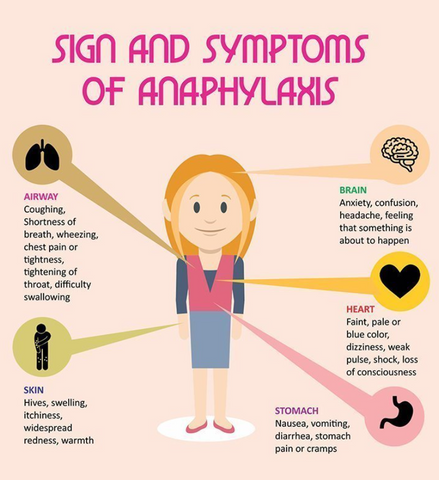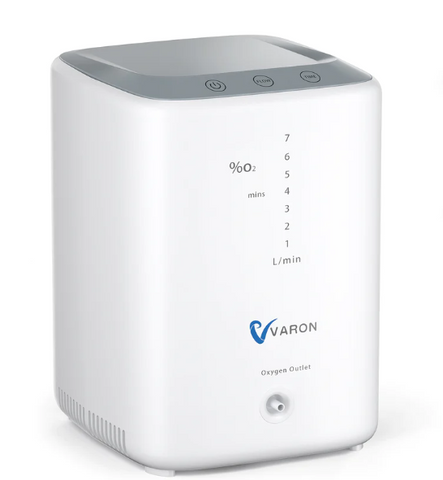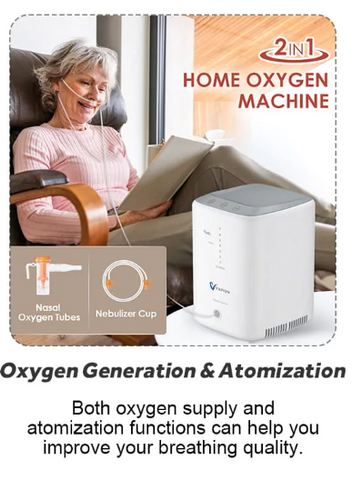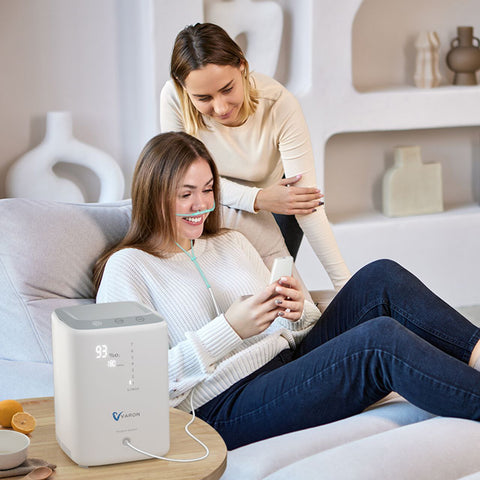Can Allergies Cause Shortness of Breath? Understanding the Connection
Home oxygen concentrator like the VARON NT-04 an affordable oxygen concentrator can be a lifesaver for individuals struggling with shortness of breath, but did you know allergies can also be a culprit? While many associate allergies with sneezing and itchy eyes, they can also trigger respiratory difficulties like shortness of breath. Understanding this connection is crucial for managing allergy symptoms and improving your overall well-being.
The Link Between Allergies and Breathing Issues

Allergies occur when the immune system overreacts to harmless substances like pollen, dust mites, or pet dander, mistaking them as threats. This triggers an inflammatory response, releasing chemicals that can affect various parts of the body, including the airways.
Common Allergens Affecting the Respiratory System
Several allergens can target the respiratory system, leading to breathing difficulties:
- Seasonal allergens: Pollen from trees, grass, and weeds can cause seasonal allergies, triggering symptoms during specific times of the year.
- Year-round allergens: Dust mites, pet dander, mold, and cockroaches are common indoor allergens that can cause year-round issues.
Allergy-Induced Respiratory Symptoms
Allergic reactions can manifest in various ways, including:
- Sneezing: A common symptom caused by irritation of the nasal passages.
- Congestion: Inflammation in the nasal passages can lead to a stuffy or runny nose.
- Coughing: The body's attempt to clear irritants from the airways.
- Wheezing: A high-pitched whistling sound during breathing caused by narrowed airways.
- Shortness of breath: Difficulty breathing due to airway inflammation or constriction.
It's important to distinguish between allergic rhinitis (affecting the nose and sinuses) and allergic asthma (primarily targeting the lungs). While both can cause shortness of breath, allergic asthma involves airway constriction, leading to more severe breathing difficulties.
Understanding Allergic Asthma
In allergic asthma, exposure to allergens triggers inflammation and narrowing of the airways, making breathing difficult. Symptoms like wheezing, chest tightness, and shortness of breath can occur, often requiring proper management and treatment to ensure better respiratory health.
Identifying Allergy-Induced Asthma
Diagnosing allergic asthma can be challenging as it shares symptoms with other respiratory conditions. Consulting an allergist is crucial. They utilize medical history, physical examination, and specific tests like skin prick tests or blood tests to identify the underlying cause. If you experience recurrent or persistent shortness of breath, especially after exposure to potential allergens, seeking medical attention is crucial.
When to See a Doctor for Shortness of Breath
Shortness of breath can be a symptom of various medical conditions, including:
- Allergies
- Asthma
- Heart-related issues
- Chronic obstructive pulmonary disease (COPD)
- Lung damage from smoking
While allergies can contribute to shortness of breath, it's essential to consult a doctor to rule out other potential causes and determine the best course of action. They may recommend consulting an allergist if allergies are suspected.
Emergency Situations (Anaphylaxis)

In rare cases, allergies can trigger anaphylaxis, a severe allergic reaction requiring immediate medical attention. Symptoms include rapid drop in blood pressure, difficulty breathing, and loss of consciousness. If you suspect anaphylaxis, call emergency services immediately.
Managing Allergy-Induced Shortness of Breath
Managing allergy-induced shortness of breath involves a multi-pronged approach:
1. Understanding Your Allergens
Identifying the specific allergens that trigger your symptoms is crucial for effective management. Allergy testing can help pinpoint the culprits.
2. Allergen Avoidance Strategies
Minimizing exposure to allergens is key. This may involve:
- Indoor environment changes: Regular cleaning, using air purifiers, and investing in hypoallergenic bedding can reduce dust mites and other indoor allergens.
- Staying indoors on high pollen count days can help manage seasonal allergies.
3. Medications and Treatment Options
Several medications can help manage allergy symptoms and prevent shortness of breath, including:
- Antihistamines: Reduce the immune system's response to allergens.
- Decongestants: Relieve nasal congestion and improve breathing.
- Inhaled corticosteroids: Reduce inflammation in the airways.
- Bronchodilators: Relax the airways, making breathing easier.
- Immunotherapy (allergy shots): Long-term treatment that gradually reduces sensitivity to allergens.
Consulting a healthcare professional is essential to determine the most suitable treatment plan for your individual needs.
4. Lifestyle Adjustments for Better Breathing
- Maintaining a healthy weight: Excess weight can put strain on the lungs, worsening breathing difficulties.
- Smoking cessation: Smoking irritates the airways and significantly worsens allergy symptoms.
- Deep breathing exercises and yoga: Can improve lung capacity and reduce stress, which can exacerbate allergy symptoms.
Living with Allergies and Shortness of Breath
While allergies can cause shortness of breath, understanding the connection and implementing effective management strategies can significantly improve your quality of life. Remember, consulting a healthcare professional is crucial for proper diagnosis and personalized treatment plans.
The VARON NT-04 Home Oxygen Concentrator: An Affordable Oxygen Concentrator
2IN1 VARON 1-7L/min Home Oxygen Concentrator NT-04
While not a primary treatment for allergy-induced shortness of breath, Home oxygen concentrator like the affordable oxygen concentrator VARON NT-04 can offer supplementary oxygen therapy in certain situations. This can be particularly helpful for individuals with severe allergies or underlying respiratory conditions that contribute to breathing difficulties.
VARON NT-04 Highlights:
Complete Accessory Set:
- Everything you need for worry-free oxygen therapy: The NT-04 package includes all essential accessories, including adult and child masks, for immediate use.
Versatile Functionality:
- Oxygen therapy and nebulizer treatment: Delivers consistent oxygen flow (up to 7 LPM) and features an integrated nebulizer for convenient in-home respiratory support.
- Impressive 72-hour continuous operation: Ensures uninterrupted therapy sessions.
Compact and Convenient:
- Lightweight design (10.58 lbs): Offers portability and easy setup.
- Sleek and modern design: Features a hidden display screen with backlight for clear visibility, and the option to turn it off for nighttime use.
Pure and Clean Oxygen:
- Automatic humidification: Eliminates the need for frequent water refills and ensures patient comfort.
- 10-stage filtration system: Guarantees clean and high-purity oxygen for optimal therapy effectiveness.
Quiet Operation:
- Noise level below 42 dB: Creates a peaceful environment for daytime activities and restful sleep.
User-Friendly Features:
- Timing, SOS function, remote control, and sleep mode: Enhance comfort and convenience during daily use.
Reliable Service:
- Comprehensive one-year warranty: Provides peace of mind and ensures reliable performance.
Two Charging Options:
- AC power supply: Suitable for home, hotel, office, or indoor use.
- DC power supply: Enables convenient use in the car.
Important Note:
It's crucial to remember that using a home oxygen concentrator, like the NT-04, an affordable oxygen concentrator should only be done under the guidance and supervision of a healthcare professional. They can assess your individual needs and determine if supplemental oxygen therapy is appropriate for your case.
Home Oxygen Concentrator and Allergies: Understanding the Connection
While home oxygen concentrator are primarily used for respiratory conditions like COPD and asthma, they can indirectly offer relief for certain allergy symptoms under specific circumstances. Here's how:
1. Mitigating Allergic Rhinitis:
- Nebulizers: These devices convert liquid medication into a fine mist inhaled through a mask or mouthpiece. While typically used for delivering bronchodilators in respiratory illnesses, they can also be used with saline solution to moisturize and clear nasal passages in cases of allergic rhinitis. This can help reduce congestion, coughing, and postnasal drip, offering temporary relief from allergy symptoms.
2. Managing Sleep Apnea Caused by Allergies:
- Continuous Positive Airway Pressure (CPAP) machines: These devices deliver constant air pressure through a mask to keep airways open during sleep. While primarily used for treating sleep apnea, they can also be beneficial for allergy sufferers who experience sleep apnea triggered by nasal congestion. By keeping airways open, CPAP machines can improve sleep quality and alleviate associated daytime fatigue.
Important Points to Remember:
- Consulting a doctor is crucial: Before using any home oxygen concentrator for allergies, it's essential to consult a healthcare professional. They can assess your individual needs, diagnose the underlying cause of your symptoms, and determine if a home oxygen concentrator is a suitable option for you.
- Limited effectiveness: Home oxygen concentrators are not a cure for allergies and should not be considered a primary treatment method. They may offer temporary relief for certain symptoms, but they won't address the underlying cause of allergies.
- Addressing the root cause: The most effective way to manage allergies is to identify and avoid allergens whenever possible. This may involve allergy testing, implementing allergen avoidance strategies, and using prescribed medications like antihistamines and nasal corticosteroids.
Conclusion
Understanding the link between allergies and shortness of breath empowers you to take an active role in managing your health. Home oxygen concentrator can indirectly provide some relief for certain allergy symptoms in specific situations. However, it's crucial to consult a doctor for proper diagnosis and treatment plan, and remember that they are not a substitute for addressing the underlying cause of allergies.
Take charge of your breath, breathe easier, and live a healthier life.







